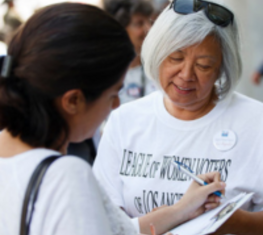Blog
Our nation is at a crucial turning point, how we proceed will determine whether our democracy survives. Our system of government is fractured, but the will of the people is strong. We don’t have a reputation for backing down and we will not give up now. Quite the opposite.
Just as our advocacy led, directly or indirectly, to all the gains mentioned above, our actions can save our democracy in this pivotal moment.
As the late, great civil rights activist Bob Moses, who passed this last April, said, “Do what you think actually needs to be done, set an example, and hope your actions will click with someone else.” This year, you did what needed to be done, setting the stage for an even more dynamic 2022.
Right now, our country can advance and protect our right to vote by passing the Freedom to Vote Act, the John Lewis Voting Rights Advancement Act, and DC Statehood. While these bills ensure a democracy that works for us all, all we have seen is stagnation in the Senate due to the Jim Crow Era filibuster.
In the past year, the League has joined litigation to fight back against the flood of anti-abortion bills that have been put forward across the country.
The Native women of Haudenosaunee played a vital role in the women’s suffrage movement. Their way of living — equal participation in their government and societal roles — heavily influenced the movement’s early stages.
Although the largest impacts to limit climate change will come from countries and corporations, individuals can make a difference as well, especially by applying pressure and sharing their thoughts with elected officials. What can we do today to make a difference?
On November 3rd, the Supreme Court heard oral arguments in the case of New York State Rifle and Pistol Association v Bruen, marking one of the first times that the Supreme Court will address the scope of the 2nd amendment since 2008. Their decision will hav a significant impact on election safety.
On October 20, the League of Women Voters hosted a panel discussion on the state of democracy with four distinguished members of Congress. The panelists included Congresswomen Terri Sewell (AL-7), Jackie Speier (CA-14), Lauren Underwood (IL-14), and Nikema Williams (GA-5). Invitations were extended to Congresswomen from all parties.
Wednesday, Oct. 20, the Freedom to Vote Act came up for its first ever vote on the Senate floor. However, the bill failed to reach the 60-vote threshold needed to move forward, hitting a procedural roadblock on its way to protecting our democracy and expanding the voting rights of every American.
People often refer to climate change as an “existential threat.” This makes sense; our existence is being threatened. But as a health professional, I’d like to move away from the big, existential side of things and focus on the everyday public and individual human health threats that climate change is already causing and that most certainly will continue to worsen.
Sign Up For Email
Keep up with the League. Receive emails to your inbox!
Donate to support our work
to empower voters and defend democracy.





